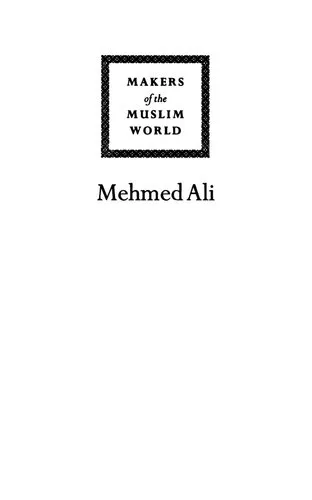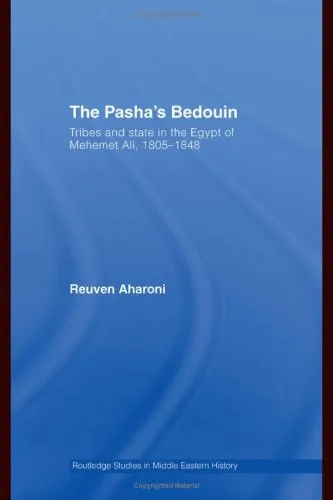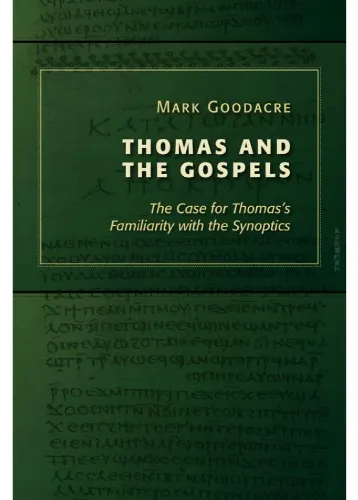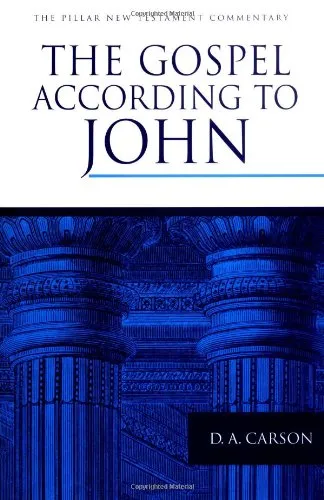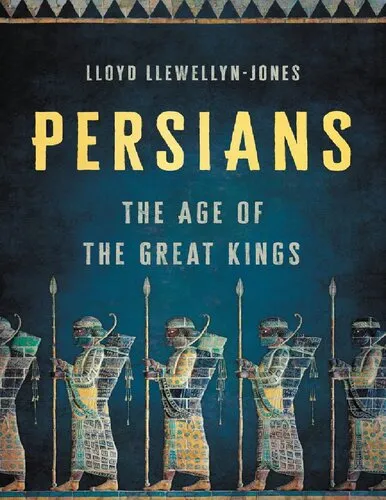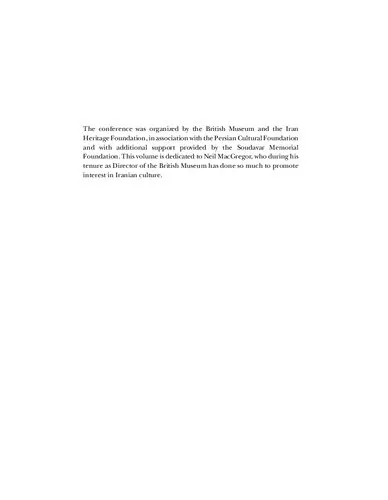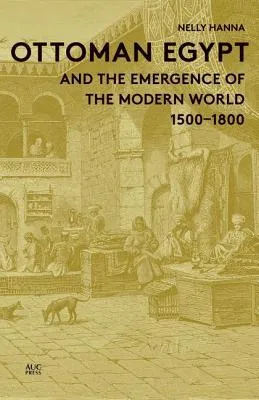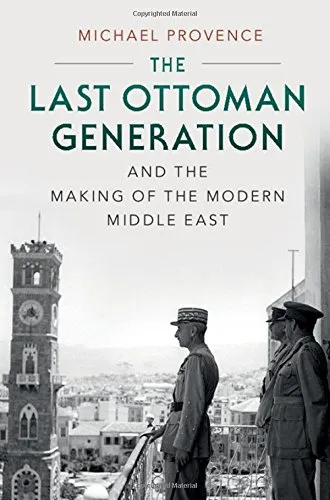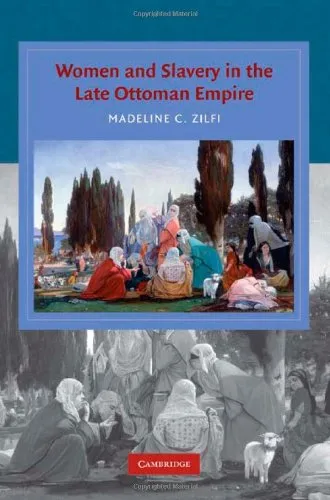Mehmed Ali: From Ottoman Governor to Ruler of Egypt
4.5
بر اساس نظر کاربران

شما میتونید سوالاتتون در باره کتاب رو از هوش مصنوعیش بعد از ورود بپرسید
هر دانلود یا پرسش از هوش مصنوعی 2 امتیاز لازم دارد، برای بدست آوردن امتیاز رایگان، به صفحه ی راهنمای امتیازات سر بزنید و یک سری کار ارزشمند انجام بدینRelated Refrences:
معرفی جامع کتاب «Mehmed Ali: From Ottoman Governor to Ruler of Egypt»
کتاب «Mehmed Ali: From Ottoman Governor to Ruler of Egypt» نوشته خالد فهمی یکی از جامعترین و برجستهترین بررسیها در مورد زندگی و میراث محمد علی پاشا است. این کتاب به شکلی دقیق و تحلیلی نشان میدهد چگونه محمد علی از یک فرماندار عثمانی که برای حفظ قدرت سنتی امپراتوری عثمانی منصوب شده بود، به یکی از بزرگترین اصلاحگران تاریخ خاورمیانه تبدیل شد. متن این کتاب بر اساس تحلیلهای تاریخی، مستندات ارشیوی، و بررسیهای دقیق روابط سیاسی، اجتماعی، و نظامی در دوره حکومت محمد علی پاشا نگارش یافته است.
خلاصه کامل کتاب
این اثر زندگینامهای دقیق از محمد علی ارائه میدهد؛ شخصیتی که اغلب او را معمار مصر مدرن میدانند. محمد علی که در اصل از آلبانی بود، در نهایت به عنوان فرماندار مصر در امپراتوری عثمانی منصوب شد و از سال 1805 قدرت را در این سرزمین در دست گرفت. فصلهای متعددی از این کتاب به چگونگی تغییر و تحولات گسترده سیاسی و نظامی، بهبود زیرساختها، و تلاش برای مدرنسازی ارتش مصر اختصاص دارد. خالد فهمی در این کتاب روی نقاط عطفی همچون جنگهای عثمانی-فرانسوی، اصلاحات اقتصادی در کشاورزی، و حتی بنیانگذاری ارتش منظم مدرن مصر تمرکز کرده است.
این کتاب همچنین به روابط چالشبرانگیز او با دولت عثمانی میپردازد. محمد علی در دوران زمامداریاش توانست به استقلالی نسبی برسد و به نوعی پایهگذار حکومتی شود که بعدها به خاندان او وابسته بود. خالد فهمی در این کتاب بهطور خاص به این پرسش میپردازد که چگونه سیاستهای محمد علی پیامدهای بلندمدتی برای آینده مصر و خاورمیانه داشت.
کلیدیترین درسها و برداشتها
- محمد علی نمادی از مدرنسازی ریشهای در خاورمیانه است که هنوز بسیاری از دولتهای منطقه از مدل و فلسفه او درس میگیرند.
- افزایش قدرت نظامی، اصلاح زیرساختهای اقتصادی، و انتقال مدل عثمانی به شکل مدرنیزهشده از مفاهیمی بوده که محمد علی در دوران خود بنیانگذاری کرده است.
- کتاب بینشی عمیق به چگونگی درگیری قدرت محلی و قدرتهای امپراتوری میدهد؛ موضوعی که همچنان در جهان مدرن بهشدت مرتبط است.
جملات معروف از کتاب
«محمد علی نه تنها یک فرماندار ساده عثمانی باقی نماند، بلکه خود به بازآفرینندهای تبدیل شد که مصر را به چیزی بسیار فراتر از یک ایالت معمولی عثمانی بدل کرد.»
«میراث محمد علی فراتر از مرزهای مصر امتداد یافت؛ او الگویی ایجاد کرد که نه فقط در خاورمیانه بلکه در تمام نقاط جهان تاثیرگذار بود.»
چرا این کتاب اهمیت دارد؟
«Mehmed Ali: From Ottoman Governor to Ruler of Egypt» اثری بیش از یک زندگینامه تاریخی ساده است. این کتاب به درک تطورهای سیاسی و اجتماعی خاورمیانه کمک میکند و بهشدت مورد توجه محققان تاریخ، دانشجویان، و هر کسی که به مطالعه تغییرات بنیادین سیاسی علاقهمند است، قرار دارد. محمد علی شخصیتی است که تاریخ جهان را تحت تاثیر قرار داد و خواندن این کتاب به شما کمک میکند چشمانداز وسیعی از تاریخ مدرن خاورمیانه بدست آورید. این اثر نهتنها به تحلیل گذشته میپردازد، بلکه به مخاطب کمک میکند تا از میراث سیاسی و اجتماعی محمد علی در تحلیل مسائل امروز استفاده کند.
Introduction to "Mehmed Ali: From Ottoman Governor to Ruler of Egypt"
"Mehmed Ali: From Ottoman Governor to Ruler of Egypt" is a riveting examination of one of the most powerful figures in Middle Eastern history, a man who rose from obscurity to dominate Egypt and reshape the dynamics of the Ottoman Empire during the early 19th century. Written with precision and backed by extensive research, this book delves deep into Mehmed Ali's life, ambitions, and his impact on the region he sought to control and modernize.
The book is an exploration of Mehmed Ali's transition from an Ottoman governor to a dynamic and independent ruler of Egypt, tracing the political, social, and economic changes he implemented during his reign. It is essential reading for students of Middle Eastern history, political science, and anyone interested in understanding transformative leadership during a time when empires were grappling with internal reform and external pressures.
Detailed Summary of the Book
"Mehmed Ali: From Ottoman Governor to Ruler of Egypt" chronicles Mehmed Ali's ascension from humble beginnings as an Albanian soldier in the Ottoman army to becoming the ruler of Egypt, arguably the most important and strategic region of the Ottoman Empire. Divided into carefully organized chapters, the book follows Mehmed Ali's journey starting from his arrival in Egypt in 1801 as part of the Ottoman forces aiming to expel Napoleon's expedition.
The book highlights his tactical genius, which allowed him to consolidate power in Egypt by eliminating rivals and establishing a centralized government. Key developments include Mehmed Ali’s agricultural reforms, military restructuring, and his ambitious economic policies aimed at modernizing Egypt’s infrastructure. The narrative also addresses his conflicts with the Ottoman Empire, his wars in Arabia, Sudan, Greece, and Syria, as well as his eventual confrontation with European powers.
Throughout the book, Mehmed Ali emerges not only as an ambitious and often ruthless leader but also as a reformer who attempted to balance modernization with his own authoritarian control. While the reforms he introduced laid the groundwork for many of Egypt's modern institutions, the book also critiques the exploitative nature of some of his strategies, particularly relating to forced labor and monopolistic economic practices.
Key Takeaways
- Mehmed Ali's governance was pragmatic, blending military strength and administrative innovations.
- He laid the foundations for modernized state institutions, especially in agriculture and education.
- His rise emphasized the complexities of Ottoman imperial power during the 19th century.
- Despite his reforms, many criticized his rule for its authoritarian nature and reliance on forced labor.
- Mehmed Ali's legacy still shapes discussions on modern statecraft in the Middle East.
Famous Quotes from the Book
"Mehmed Ali exemplified a leader who, through sheer ambition and strategic genius, sought not only to command Egypt but to redefine its place in the world."
"The transformations initiated by Mehmed Ali were not merely about acquiring power, but about constructing a vision of control that blended reform with exploitation."
Why This Book Matters
In an era where global power dynamics are continually shifting, understanding the life and strategies of Mehmed Ali provides a fascinating case study in leadership, reform, and state-building. This book matters because it challenges readers to think critically about how leaders consolidate power, the balance between modernization and authoritarianism, and the legacy of such figures within their societies.
For students, scholars, and historians, the book offers unprecedented insights into Mehmed Ali’s unique position as both a reformer and a ruler. For casual readers, it sheds light on an era less known in the West but pivotal in shaping the modern Middle East. Overall, this work proves to be more than just a biography—it is a window into the political and social complexities of 19th-century Egypt and its position within the Ottoman Empire.
"Mehmed Ali: From Ottoman Governor to Ruler of Egypt" is not simply history; it is a narrative of ambition, resilience, and the intricate dance between tradition and reform. Whether you are a seasoned historian or a curious learner, this book will leave you with a heightened understanding of Mehmed Ali's enduring significance.
دانلود رایگان مستقیم
شما میتونید سوالاتتون در باره کتاب رو از هوش مصنوعیش بعد از ورود بپرسید
دسترسی به کتابها از طریق پلتفرمهای قانونی و کتابخانههای عمومی نه تنها از حقوق نویسندگان و ناشران حمایت میکند، بلکه به پایداری فرهنگ کتابخوانی نیز کمک میرساند. پیش از دانلود، لحظهای به بررسی این گزینهها فکر کنید.
این کتاب رو در پلتفرم های دیگه ببینید
WorldCat به شما کمک میکنه تا کتاب ها رو در کتابخانه های سراسر دنیا پیدا کنید
امتیازها، نظرات تخصصی و صحبت ها درباره کتاب را در Goodreads ببینید
کتابهای کمیاب یا دست دوم را در AbeBooks پیدا کنید و بخرید
1638
بازدید4.5
امتیاز0
نظر98%
رضایتنظرات:
4.5
بر اساس 0 نظر کاربران
Questions & Answers
Ask questions about this book or help others by answering
No questions yet. Be the first to ask!
